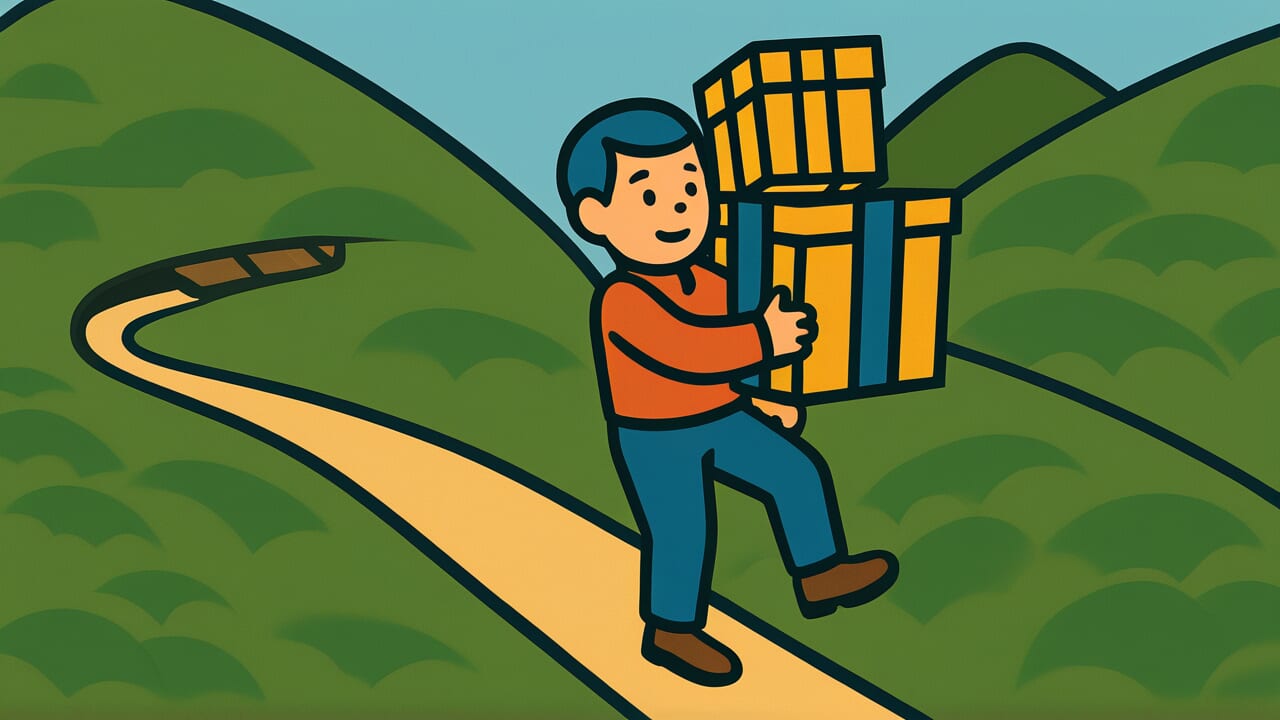How to Read “Going up without knowing, coming down with souvenirs”
Nobori shirazu no kudari miyage
Meaning of “Going up without knowing, coming down with souvenirs”
“Going up without knowing, coming down with souvenirs” is a proverb that describes someone who talks about things they’ve never actually seen or experienced as if they witnessed them firsthand.
This proverb criticizes people who pretend to have experienced something they haven’t. It’s especially used for those who show off with fake stories or lie about their experiences to impress others.
The cleverness of this expression lies in its logical contradiction. It describes an impossible situation where someone brings back souvenirs from a journey they never took. This contradiction brilliantly exposes how unbelievable such stories are.
Even today, this applies to people who post photos of places they’ve never been on social media as their own experiences. It also fits those who pretend to know about books they haven’t read.
This proverb captures a human weakness. People sometimes exaggerate or lie because of vanity or the desire for approval.
Origin and Etymology
No clear historical records explain the origin of this proverb. However, the structure of the phrase offers interesting clues.
“Going up” in the Edo period meant traveling from the countryside to Edo (now Tokyo). Edo was the political and cultural center of Japan. For people in rural areas, Edo was a dream destination.
“Coming down” meant returning from Edo to the countryside.
The interesting part is the phrase “without knowing the going up.” It describes the contradictory situation of bringing back souvenirs from the return journey without ever making the outward journey. Logically, you can’t come back from a place you never went to.
During the Edo period, most people living in rural areas never had the chance to visit Edo in their lifetime. However, stories about Edo were fascinating and attracted people’s interest.
Some people talked about Edo as if they had seen it themselves, even though they had never been there. This proverb likely emerged as a sarcastic way to describe such people.
The structure of the phrase itself contains a logical contradiction. This contradiction perfectly captures the essence of tall tales.
Usage Examples
- His stories about living abroad are “going up without knowing, coming down with souvenirs” – apparently he never left the airport
- That person’s heroic tales are “going up without knowing, coming down with souvenirs,” so don’t take them seriously
Universal Wisdom
“Going up without knowing, coming down with souvenirs” brilliantly captures the universal human traits of seeking approval and vanity. Why do people talk about things they haven’t experienced as if they have?
At the root is a strong desire to be recognized and respected by others. Humans are social creatures who constantly think about their position in the group.
Having special experiences or knowledge becomes a way to increase one’s value. But when people lack such experiences, they face temptation. What starts as small exaggeration can grow into complete fiction.
What’s interesting is that this proverb doesn’t just condemn liars. It also points out their ridiculousness. The logical contradiction in the expression highlights the foolishness of tall tales.
The obvious contradiction of bringing back souvenirs from a journey you never took suggests how fragile lies are. They will eventually be exposed.
Our ancestors deeply understood that humans are creatures who lie out of vanity. They also knew that such lies always show cracks eventually.
This proverb teaches about human weakness and the importance of truth, all with a touch of humor.
When AI Hears This
From an information theory perspective, this proverb points out a structural flaw created by one-sided information gathering. The concept of information entropy tells us that understanding an event correctly requires sufficient information.
For example, going up and coming down a mountain offer completely different views, levels of physical exhaustion, and sense of time. Someone who knows only the descent without experiencing the ascent has perhaps only 20 percent of the total information, not even 50 percent.
This is because the experience of going up gives meaning to coming down.
More serious is the sampling bias. Someone who only experienced the descent creates their judgment of “what mountain paths are like” from a biased sample. This has the same structure as modern social media, where people judge everything by only seeing viral posts.
In statistics, drawing conclusions from only part of a population is called “sampling error.”
What’s interesting is that people with only descent experience tend to speak most confidently. In information theory, less information should mean higher uncertainty. Yet human cognition works backwards, creating the illusion that “what I know is everything.”
This is called the Dunning-Kruger effect. It’s a known phenomenon where people with less knowledge have higher self-assessment.
Lessons for Today
This proverb teaches us that honesty is the only path to building long-term trust.
In our modern world with social media, the temptation to make ourselves look good is stronger than ever. When you see glamorous posts, you might want to show that you have special experiences too.
But false appearances always crack. And regaining lost trust is far more difficult than you imagine.
What matters is honestly sharing your experiences and knowledge. Having the courage to say “I don’t know” or “I haven’t experienced that” is actually the most respected attitude.
You don’t need to be perfect. In fact, people who can acknowledge their limits are the ones who can truly grow.
When you don’t know something, that’s not shameful. It’s a chance to learn. The humility to say “please teach me” is far more attractive than lying to save face.
Only words based on truth truly reach people’s hearts.



Comments